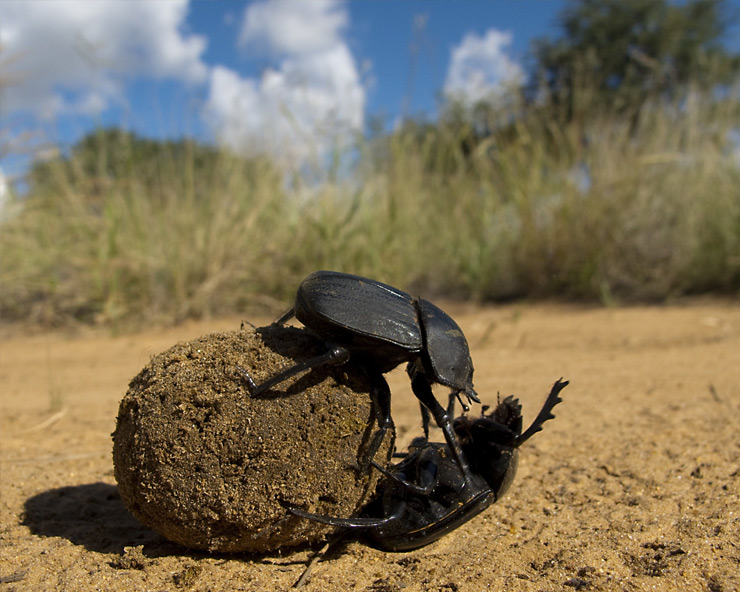With emerging diseases, a changing climate, and concerns about feeding a growing population, organic and alternative producers face many challenges. Fortunately, farmers worldwide are getting a helping hand from an unexpected friend.
Dung beetles are an often-overlooked part of agriculture, but their benefits are beginning to become unearthed. With over 6,000 species of dung beetles worldwide, these small insects can have a huge impact. Most species of dung beetle are “tunnelers.” This means they collect dung from the surface and carry it underground to feed their young. At the same time, they are also burying the nitrogen in this dung. This process can bring many benefits to farmers of both produce and livestock. However, like many insects, dung beetles are in danger. The biggest threat is from synthetic pesticides, often used in conventional agriculture. As organic and alternative producers, your choice to farm without synthetic pesticides allows dung beetles to thrive. Read on to learn how these insects supported by your practices can return the favor!
Soil Health
Burrowing carries more nitrogen into the soil through the tunnels of dung beetles. This allows the soil to hold more water and support healthy crops. With more water retained in the soil, less water leaves fields as runoff. In a greater scope, this also helps to prevent the formation of “dead zones” in surrounding bodies of water. These zones result from extra nitrogen, often from agriculture.
Pest Control
Waste attracts a greater variety of parasites and supports their survival. Along with pests, this also brings negative effects to the livestock or produce in the area. By collecting and spreading feces, dung beetles can disrupt the lifecycle of dung-breeding flies. Without their breeding habitat available on the surface, these pests do not have the opportunity to lay eggs and reproduce. Removing waste at the surface also helps prevent the attraction of any additional pests such as harmful worms.
Biodiversity
Biodiversity in agriculture is vital. It helps maintain a food supply resistant to threats like disease and a changing climate. Having dung beetles as pest control reduces the need to use other practices. Many of these alternatives could inadvertently harm the biodiversity of the area. Organic and alternative producers are already very conscious of materials applied to their land. However, other practices, such as clearing land, can impact the area’s biodiversity by eliminating habitat. By capitalizing on the pest control services provided by dung beetles, farmers can maintain a habitat for biodiversity. And you can do so without the concern of breeding harmful pests!
Food Safety
Food safety concerns create an interesting conflict in the research of dung beetles and their role. When infected feces is taken below ground, it is hard for pathogens to survive and pass between animals. On produce farms, the processing of fecal matter left by wildlife reduces the chance that any infected feces can come into contact with food products. However, finding producers willing to subject their farms to potential risks in food safety has proven to be a tall task for researchers looking to prove the efficacy of dung beetles.
By welcoming dung beetles onto your farm, you can help protect biodiversity in the area and reap the may benefits that these tiny insects can provide. This mutually beneficial relationship serves as a reminder that, even when working to feed the world, it’s important to keep the little things in mind.


If you want dung beetles you cannot use ivermectin pour ons or injectables in the spring for certain and more than likely period. Can they be reintroduced after you quit using ivermectin pour ons–how successfully? I have seen darn few in my practice area lately and I have been looking. I see the organic certifiers now allow cydectin pour ons. Won’t that kill dung beetles as well when residues are in the manure? I would appreciate some answers and I thought you could have touched on some of this in the blog to make it worthwhile. I could not open up any of the subtitles on my home computer with more than likely poor internet connections playing a role. Thanks, Art Dunham DVM Anyone from your outfit going to PFI meeting?
This passage highlights the benefits of dung beetles for organic and alternative farmers, emphasizing their role in soil health, pest control, biodiversity, and food safety. The author notes that the use of synthetic pesticides in conventional agriculture poses a threat to dung beetles, and that organic and alternative farming practices can support their survival. The passage also highlights the importance of considering the role of small insects like dung beetles in agriculture, and the benefits that can come from maintaining a mutually beneficial relationship with them. Overall, the passage presents a compelling argument for the benefits of dung beetles for organic and alternative farming practices.